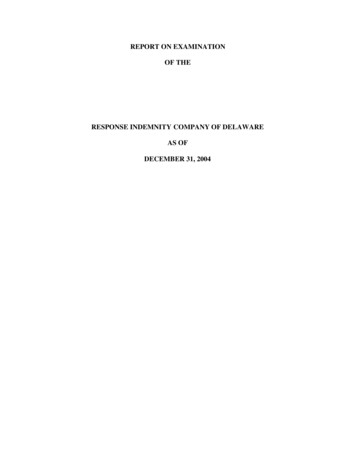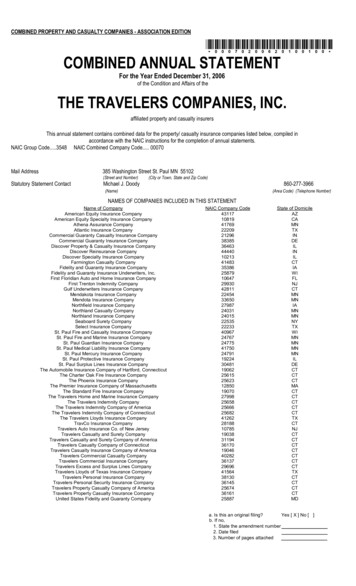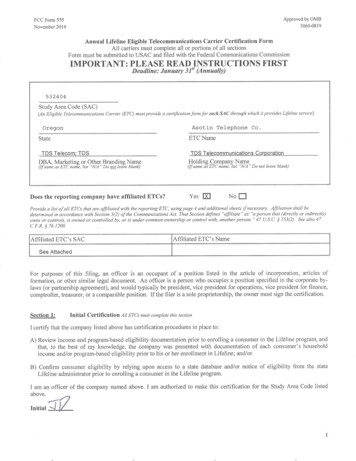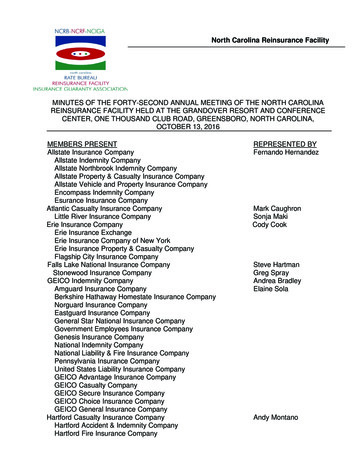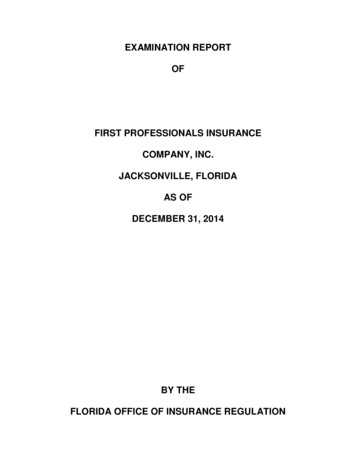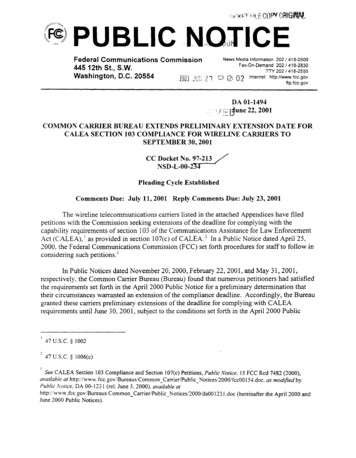
Transcription
Is the role ofcompany secretaryfit for the future?
ContentsSectionPageKey messages04Introduction05Who is responsible for governance?06Who do company secretaries report into?08How has the role changed?10What are company secretaries now responsible for?13Is the role sufficiently supported?15The survey17Are you fit for the future?18The role of the company secretary: fit for the future?
Key messages80%say the role of the companysecretary has increased inresponsibilities and breadthIncreased responsibility inthe role is largely attributedto regulation and associatedcomplianceAdministrative work still takes up the bulkof the role87%81%are responsiblefor complianceboard packsGreater focus is being given tosupporting board development54%are involvedin boardrecruitment38%have no team to support thegovernance role31%of company secretaries have noformal qualificationdo not deliverinduction ortraining to theboardExternal liaison is not a priority15%are involved ininvestor relations53%regulator liaisonTechnology use is inconsistent andhas not necessarily improved qualityor efficiency62%use it for admin(emailingboard packs orelectronic filing)4 The role of the company secretary: fit for the future?36%14%use it forother means
IntroductionIncreasingly, governance is being viewed as a fundamentalenabler of trust and, at its heart, is the promotion oftransparency and accountability between all of society’sstakeholders. Governance frameworks guide decision-makingin organisations and dialogue with stakeholders.As the role of governance changes and progresses, so doesthe role of the company secretary and those tasked withimplementing governance. What was once traditionallyviewed as an administrative role is now expanding in somesectors with the company secretary viewed as accountablefor the embedding of effective governance practices withinthe organisation. Increasingly, the chair of the board looks tothe company secretary to advise them not only on matters ofcompliance but for effective working of governance practicesat board level, how these are manifesting in the organisationand their impact on stakeholders. Ultimately the companysecretary is one of the key governance professionals, and acritical conduit between the board and the organisation.Drawing on our research and work with boards across multiplesectors (corporate, housing, charity and Not for Profit andpublic sector), this report looks into the evolving role of thecompany secretary in the setting, managing and promoting ofgovernance standards.It is clear that there is a demand for the role of the companysecretary to become a strategic partner to the organisation;however, these increasing responsibilities are not alwaysbeing reflected through changing resource or support.Equally there remains a legacy perception of the role in thewider organisation as one associated with company law andadministration, rather than a key shaper of an organisation’sgovernance framework which guides and enables effectivedecisions. This is a concern if it undermines the authorityand effectiveness of the role, and its ability to addresschanging expectations in society.Governance is not a compliance exercise that is to bedelegated – it has to be owned by all members of the board,supported by the company secretary. There has to be a clearframework in place that sets the tone for decision-making andcommunication. This gets to the heart of the changing roleof the company secretary.For this report, we surveyed and interviewed board membersfrom a range of organisations, and ask: Who fulfils the company secretary role? How does the role fit with the entity structure? How has the role changed? What are they now responsible for? How much resource is allocated to the role ofcompany secretary?Simon LoweChair, Governance InstituteJenny BrownChief Operating Officer, Not for ProfitGovernance Institute memberThe role of the company secretary: fit for the future? 5
Who is responsiblefor governance?In our work with organisations we find that althoughgovernance is the responsibility of many individuals at boardlevel and below, the person accountable for overseeing theeffectiveness and evolution of governance and embeddinggovernance within the organisation can vary and often dutiescan slip between the cracks.When we asked respondents who in their organisationis responsible for governance, 45% said that it is thecompany secretary.Another 22% said that whilst the company secretary wasresponsible for governance they also had other primary rolessuch as Financial Director (FD) or General Counsel (GC).While this might be appropriate for some entities, the corporategovernance code is clear on the need for a distinct role for acompany secretary. With the governance landscape evolvingthis structure may not allow for the accountability and freshperspectives needed to ensure that governance practices areeffective and enable strategy.Combining roles is more of a common theme in privatecompanies and charities. The rationale is often to keepthe executive team small, reduce the number of peoplein meetings and ensure that the company secretary hassufficient authority. The balance to this, however, is that whengovernance is not their primary role, insufficient time may beavailable and assumptions may be made about their relevantskills and experience. Another concern when combining roles isensuring the person has an independent view.Who is responsible for governance in your organisation? (%)Company secretary46.6Other executive (generalcounsel/financial director/CEO)22.3Head of governance16.6Dual role (company secretary aspart of executive role)8.75.8Other06 The role of the company secretary: fit for the future?1020304050
For a further 28% of respondents the company secretary isanother individual entirely, such as the CEO or GC. This maymean there is a company secretary who reports into their role,or that the organisation does not have a company secretaryat all. When an executive assumes the role of the companysecretary we found they were likely to have a smaller number ofgovernance specific responsibilities: typically between two andnine, compared to between 10 and 14 for dedicated companysecretaries. This might suggest insufficient time or resourcebeing allocated to the role. With the exception of privatecompanies who may not have independent non-executivedirectors, this combining of roles may throw into questionthe objectivity of the advice being provided to the board. Forlarger corporates and all the other organisations we surveyedthis may be a risk to governance, particularly in relation toproviding a balanced view as to what is required to strengthenthe practices.Insufficient investment in governance may not have immediateshort-term implications but over the longer term it can havea more detrimental impact if governance frameworks inhibitstrategic decision-making and/or lead to events or behavioursthat impact reputation. Perhaps, as 17% of respondents do, therole should be called ‘head of governance’, as this might reflectbetter what the role entails and the requisite level of seniority.The role of the company secretary: fit for the future? 7
Who do company secretariesreport into?One factor that can have a key influence over the companysecretary role is where their role sits within the entity structure.Guidance on good governance1 states that the companysecretary is accountable to the board through the chair onareas relating to governance.However, as a full or part time employee of the entity they willnecessarily have an executive reporting line. While there is noone size fits all model, organisations need to be aware of howthe reporting line will influence the nature of the role.These example reporting lines are taken from our work withgovernance teams in a range of organisations. Rather thanbeing best practice examples, these are illustrations of therange of different structures around company secretaryroles, and how that will impact the nature, seniority andrequirements of the role.Example reporting linesBoardChairGeneralcounselChief financial istantcompany secretary/Legal AssistantOrganisation 1: public companyIn this organisation the company secretary reportsdirectly to the CFO and works closely with the chair ongovernance matters. The company secretary supportsthe board in their function, attending all board andcommittee meetings, producing board packs, managingboard effectiveness reviews and coordinating directortraining and induction. They also maintain the group riskregister alongside the risk and assurance director.The annual report writing is co-ordinated by theinvestor relations manager, with the company secretarycontributing to the relevant governance sections(including board and committee) of the report.The company secretary works alongside the general legalcounsel on compliance and regulation matters. They areboth supported by an assistant company secretary/legalassistant – the role is a dual role and they have a legalbackground and are ICSA qualified.1 For instance the FRC’s Guidance on Board Effectiveness.8 The role of the company secretary: fit for the future?
BoardBoardCEOChairFinancial controller/Company secretaryDeputy company secretaryCompany secretaryAssistant/traineeAssistant company secretaryAdministratorAdministratorOrganisation 2: Housing associationIn this organisation the secretariat is organised as astand-alone unit. The company secretary oversees andmanages all activities of the secretariat team and isaccountable to the board directly. They report directlyinto the CEO and has a ‘dotted line’ to the chair –working closely with them on governance matters.There are no additional reporting or investor relationsdepartments. The company secretary attends all boardmeetings and committee meetings, and is responsiblefor producing the governance sections in the annualreport. They, and a member of the secretariat team, havegovernance qualifications.Organisation 3: CharityIn this entity the company secretarial role is undertakenby the financial controller. He does not have formalgovernance qualifications, but the deputy and assistantare both ICSA qualified and the deputy is an experiencedcompany secretary. The company secretary attendsall meetings of all boards and committees includingexecutive committee. The assistant takes the minutes atall but the executive committee where minutes are takenby the company secretary.The role sits with the financial controller, which is asenior role in this organisation, to ensure a suitably seniorhas oversight of governance and that all meetings canbe attended.The role of the company secretary: fit for the future? 9
How has the role changed?When we speak to company secretaries, and from our survey,we find that there has been significant change to the role overthe years. Eighty percent said that their role had increasedsomewhat or significantly in the time they had been in it.There was some variation across sectors. Those in theHousing sector were the most likely to state that the dutiesof the company secretary had increased, and the onlyindividuals who felt the role had decreased were from privatecompany, NHS and Charity boards. Those who said the rolehad decreased attributed it to technology making the roleeasier, or that governance had become more of a sharedresponsibility. Although these might be positive developments,these responses suggest that they see the role as purelyadministrative. It may also indicate that rather than technologybeing the enabler to create more space for broader, strategicperspectives on governance, it leads to a reduction in priority,resource and possibly influence.How has the company secretary role changedin your tenure? (%)1712Increased significantlySomewhat increased46No changeSomewhat decreased34Decreased significantly“The role has becomemore bogged down inregulatory compliance.”Board Member, Public Company10 The role of the company secretary: fit for the future?Increased regulationMany also stated that the role had increased due to greaterpressure from the regulator. Both public companies andhousing associations have had regulator focus on governancein recent years. The National Housing Federation code wasupdated in 2015 – and many housing associations arechoosing to follow the UK Corporate Governance Code(the Code). The Code has been through several changesin the last five years, particularly in 2012, updated Auditand Risk requirements in 2014, and updates to reportingrequirements and guidance. In 2017, the FRC announced afundamental review of the Code, and in 2018 have conducteda consultation on the proposed new Code. This will beannounced later in the year, but is likely to put greater pressureon governance professionals and reports preparers in meetingthe requirements of the new Code. In the NHS we have alsoseen increased public scrutiny, complexity of engagementwith different stakeholders, increased regulation, as well asincreased reporting requirements.Respondents from private companies were the least likely tostate that the company secretary role had increased. Privatecompanies are not currently required to follow a specificgovernance code or to report against this code, so this mayreflect a lack of increasing pressure from a regulator. This maybe set to change: in 2017 the UK government announced theywould be encouraging a group of key stakeholders to draft agovernance code for private companies. This is likely to leadto increasing responsibilities for the company secretarial rolein these organisations. Given that this sector was also themost likely to have the company secretary as part of anotherrole (such as the CFO or FD), private companies may needto reconsider this structure in light of increasing regulatorypressures.
Impact of technology“As a global organisation,Technology has had a big impact on the administrative aspects technology has sped upof the company secretary role. Particularly in relation to theboard management. I’m notboard pack circulation, the vast majority of organisationsreported a change to the governance role through the impactquite sure if it has made itof technology. Sixty-two percent stated that they now useany more effective.”some kind of electronic board pack circulation (this rangedfrom email to the use of more sophisticated board apps),while 4% hold virtual meetings and 10% have online training.One company secretary told us that in the last five yearstechnology had fundamentally changed the administrationpart of his role and use of electronic board apps meant boardpacks could be sent securely and easily.The changes are not always positive – one non-executivepointed out that although electronic board packs haddecreased the administration role, it had led to an increasein the size of board packs. Recent (2017) research by ICSAand Board Intelligence found that nearly three-quarters ofgovernance professionals believe that their board packs arecurrently too long2 : the average for small organisations is125 pages but this rises to 250 pages for large organisations,and can be up to 800 pages. The electronic format allowsmanagement information to be more detailed, but means lessfocus is placed on ensuring it is relevant and summarised forthe board.Another told us that although packs were sent electronicallymany directors still required them sent via email or printed, andthe take up of electronic board packs was limited.Head of Governance, CharityHow has technology affected the company secretaryrole? (%)*AllPublic companyPrivate companyOtherNHSHousingEducationCharityElectronic board papers/Online trainingadminNo changeVirtual meetingsOther* Respondents could select more than one.“Technology has had noimpact – we are still issuingpaper packs.”Company Secretary, Charity2 Challenges to Effective Board Reporting, December 2017. ch/challenges-to-effective-board-reporting.pdfThe role of the company secretary: fit for the future? 11
How has the role changed?As well as greater focus on regulation and compliance, company secretaries also point to increased responsibilities due to the rolebecoming more strategic.“My role now reports directly to the board (rather thanvia the executive) and has a much wider remit thanwas historically the case – with a focus that extendsbeyond core board governance and out onto widerorganisational policy and procedural compliance andinternal audit and providing a critical friend role to theexecutive team.”Company Secretary, Charity“As boards change, the role changes. With less of theOld Boys kind of directors they expect different thingsof the company secretary.”“I have a broader remit, especially regarding mattersof strategy.”Company Secretary, Charity“I was a company secretary for many years. Originallythe role was mostly as a servile board minute taker,which graduated over the years (largely throughcompany law requirement) to being the CompanyProtector of all things legal & moral. The work &responsibility changed massively over my 20 years.”Board Member, CharityCompany Secretary, Public Company“The role has become more strategic. I act as a trustedadvisor and independent expert.”“[There is now] an explicit requirement for the role underNHF code of governance - huge importance placed onrole by regulator and seen more so than ever as a keycontact for board and committee members.”Company Secretary“The role includes more strategic advisory.”Company Secretary, Housing“There is a regularly changing range of regulatoryexpectations, which, while periodically subject toderegulation initiatives, has progressively expanded tocover an ever wider area. Demonstrating compliance ismore time consuming than before.”Company Secretary, HousingCompany Secretary, Private Company“It has become more advisory, with increase ininfluence and role”“There has been a very significant increase in theamount of governance to be dealt with by the board,which falls to cosec to manage.”Company Secretary, NHSCompany Secretary, Public Company12 The role of the company secretary: fit for the future?
What are companysecretaries nowresponsible for?Although there is growing recognition of the role the companysecretary plays in supporting governance there is still a lack ofconsistency about what that means. How does that translateinto day to day responsibilities?The Institute for Chartered Secretaries and Administrators(ICSA) sets out suggested responsibilities for companysecretarial roles which are critical to the promotion of goodgovernance for all organisations. Many of these are reflected inthe responses. Yet our experience is that this role has a numberof different interpretations.While we found a broad range of responsibilities, with a lotof variation according to sector and title, the most commonresponsibilities are administrative and compliance-focused.What is the company secretary responsible for? (%)Investor relations15Gender pay reporting22Modern slavery36Remuneration and advisory liaison38Regulator liaison53Board recruitment process54Induction and training64Annual report writing66Procedural advice71Board effectiveness review76Key liaison for board79Board packs81Meeting arrangements83Memorandum and articles84Compliance with laws and regulations870102030405060708090“ Historically the company secretary was seen as the servant to the board, and youcan sometimes be seen as the secretary, making coffees, that sort of thing. But youcan change that. You will never be seen by the board as their equal, and you’renot. But you can avoid being seen as their servant. And some of that is about beingtreated as a person, not just as a minute taker.”Company Secretary, Public CompanyThe role of the company secretary: fit for the future? 13
Company secretaries are most commonly responsiblefor compliance, memorandums and articles, meetingarrangements and collating and distributing board packs:more than 80% of our survey respondents said the companysecretary was responsible for each of these tasks. Thissuggests, for the majority of organisations, compliance andmore administration responsibilities are the norm. Areas relatingto board effectiveness were less common: Sixty four per centdeliver induction and training, 54% are involved in boardrecruitment. Although these are typically led by the chair, thecompany secretary should play a key role in supporting thechair and board in ensuring board effectiveness.“When you’re the companysecretary you’re theconscience of the board. Andthat’s not about complianceor regulation, It’s about beingin tune with the spirit, not justthe practice of governance.You are in a senior managerposition where you see all theconversations but you don’thave the politics or decisionsthat comes with it.”Company Secretary, Public Company14 The role of the company secretary: fit for the future?“There is always going to bea core set of responsibilities– board minutes, meetings,reporting to the chair, annualreports and accounts – ontop of that there is greatflexibility. Because there is noset role, you can make of itwhat you like.”Company Secretary, Public CompanyShareholders and stakeholdersOnly 15% are involved in investor relations, 38% inremuneration advisory liaison, and 53% in regulator liaison.Those in the education organisations and public companieswere more focused on external reporting (such as writing theannual report, gender pay reporting and modern slaverystatements). While drafting the annual report is a key partof governance responsibilities – particularly for publiccompanies or those covered by reporting requirements – itis increasingly important for boards to see broader externalengagement as part of their stewardship role. Furtherrecognition will need to be given to the role the companysecretary plays in supporting this.
Is the role sufficientlysupported?While the majority of organisations have a team supportingthe company secretary or equivalent, 33% said they felt theywere struggling with resource, and only 1% said they felt theywere well resourced.Sufficient resource is about more than making sure there is alarge team: the best resourcing is efficient and ensures that theindividual and team has the right balance of responsibilitiesand support. It is also about ensuring that the role is givensufficient importance by the company and the board. As wecan see in the examples on page 8, the largest teams are notnecessarily the best supported, and some very lean teamscan still have the necessary balance of seniority, relevantqualifications and resources.To what extent do you think the role is well resourced?(%)133Under resourcedSufficiently resourced66Just under a third of respondents said that they did nothave anyone in the organisation with relevant governancequalifications. The issue of a lack of qualified individualswas more acute in the charity and housing sectors, whichhad the highest proportion of company secretaries with nospecific qualifications. This may suggest that those companysecretaries with qualifications are more likely to work in thecorporate sector than to go into Not for Profit organisations.Given the scrutiny over the housing and charity sectors withregards to governance, a lack of appropriate qualificationsmay prove to be an issue.The results highlight that the idea of ‘relevant qualifications’is very broad, and suggests many company secretaries aredrawing on qualifications that are not specific to governance.While several had ICSA qualifications, many were also legal –LLP or solicitor – or financial3 – FCA, ACCA. This may suggestthat, for the time being, qualifications are less importantthan on the job learning. In any case, there is a need forgreater clarity about what qualifications are most useful forgovernance related roles.Does the person responsible for governance holdrelevant qualifications? (%)Well resourced1Yes31QualificationsAs the role of the company secretary is so varied, there are arange of potential relevant qualifications that might supportthe role. Working closely with the finance department andbeing present in board meetings necessarily requires anunderstanding of finance and the language of the board,while the focus on compliance and regulation (which 87% areresponsible for) requires an up to date knowledge of companylaw and governance codes. They also need to be well informedon strategy and to provide appropriate induction and training.608No – but someone in theirteam doesNo – none in organisationN/A3 Although these were primarily when the FD was responsible for governance, so thequalification would be for their FD role more than the governance role.The role of the company secretary: fit for the future? 15
TeamWith the increasing responsibilities on the governancerole it is encouraging to observe that in the majority oforganisations the person responsible for governance or thecompany secretary function also has a support team. Thiscan help to ensure diversity of qualifications and experienceare on hand to cover the broad range of requirements of therole. For example, in 8% of respondents, while the personresponsible for governance does not have governancequalifications or similar, someone in the team does. Havinga team is also a valuable part of succession planning, toensure there are people in line to fill this vital role.The largest governance teams were in the education,public company and NHS sectors, who on average have ateam of three or more. In the private company and charitygovernance sectors, individuals were most likely to beresponsible for governance with little or no support.Does the person responsible for governance have ateam? (%)AllPublic companyPrivate companyOtherNHSHousingEducationCharity0No team201“There are a lot of solicitors and a lot ofaccountants, and increasing number ofcompliance people. The advantage of doinga governance qualifications is it coverslegal, administration, accountancy, tax andshareholding. It’s about learning the languageof the board.”Company Secretary, Public Company16 The role of the company secretary: fit for the future?4060280 3100
The surveyThe survey consisted of 14 questions across five ions, teamand qualificationsImpact of technologyChanges to the roleThe 105 respondents came from the following sectors:Fully listed companiesAIM companiesPrivate companiesCharitiesEducation(including universities, furthereducation colleges, schoolsand academies)NHS providers andcommissionersGovernment andregulatory bodiesThe respondents hold the following roles:Board member/Non-executive directorChief executiveHead of governanceMonitoring officerCompany secretaryDirector of finance/CFOThe role of the company secretary: fit for the future? 17
Are you fit for the future?We finish with key questions that boards, chairs and company secretariesshould ask themselves to challenge the effectiveness of the company secretaryrole, and ensure it is fit for the future.Questions to askDoes your organisation supportthe evolution of the profile of thecompany secretary?Is there sufficient investment,development and time tosupport change?How does the structure of thesecretarial team or company secretaryreporting line influence how they aretreated by the board?Could technology be used to supportthe company secretary in other waysapart from administration?Are the qualifications in the companysecretary team the most relevant anduseful to delivering good governance?Is the size of the team sufficient forthe current responsibilities of thecompany secretary? Is it scalable?Contact usSimon LoweChair, Grant ThorntonGovernance InstituteT 020 7728 2451E simon.j.lowe@uk.gt.com18 The role of the company secretary: fit for the future?Jenny BrownChief Operating Officer –Not for ProfitT 020 7728 2316E jenny.m.brown@uk.gt.comSarah BellT 020 7728 2409E sarah.bell@uk.gt.com
Advising on governance1Benchmarkingand designWhen is it relevant – Organisationswish to understand whether existinggovernance arrangements supportstrategy and/or reflect good practiceValue add – Detailed and insightfulcomparison to a database of peers andsectors and/or complianceTypes of solutions Benchmark reporting to market goodpractices Identification of areas to enable moreeffective oversight and messaging Design of roadmap andimplementation Peer and sector comparison Compliance check Preparing for sale4Leadershipand cultureWhen is it relevant – Alignment ofbehaviours to strategy and purposeValue add – Value can be protected andenabled when values and behavioursare embedded into all systems andprocesses and actively managedTypes of solutions Cultural audit and monitoring High potential assessment anddevelopment programmes Executive and board level coaching Alignment and communication ofreward mechanisms with purposeand strategy Leadership and developmentprogrammes Apprenticeship levy design2GovernancerenewalWhen is it relevant – Occurrence of asignificant change event has occurred(growth, takeover, fraud, new strategy)leading to a governance framework thatis no longer fit for purposeValue add – Facilitation, design andimplementation of corporate decisionframeworksTypes of solutions Alignment, design and integration ofgovernance framework with strategy Development and strengthening ofgovernance frameworks, policies andprocedures Group risk appetite identificationand embedding Internal control reviews and redesign Internal audit effectiveness reviews Restructuring and implementationof performance and incentivisationmeasures5Strategicsustainable reportingWhen is it relevant – Performanceis focused on short term or unbalancedtargets and/or supporting change inline with non-financial directives orUNSDG’s, etcValue add – Ensures that performanceand reporting is aligned to sustainable,long term value creation and relevantpolicyTypes of solutions Review of and a
The role of the company secretary: fit for the future? 7 For a further 28% of respondents the company secretary is another individual entirely, such as the CEO or GC.



